Salesforce Consulting Services vs. Salesforce Freelancers: What to Choose for Maximum ROI?
 Bharat Khatri Tuesday, September 2, 2025
Bharat Khatri Tuesday, September 2, 2025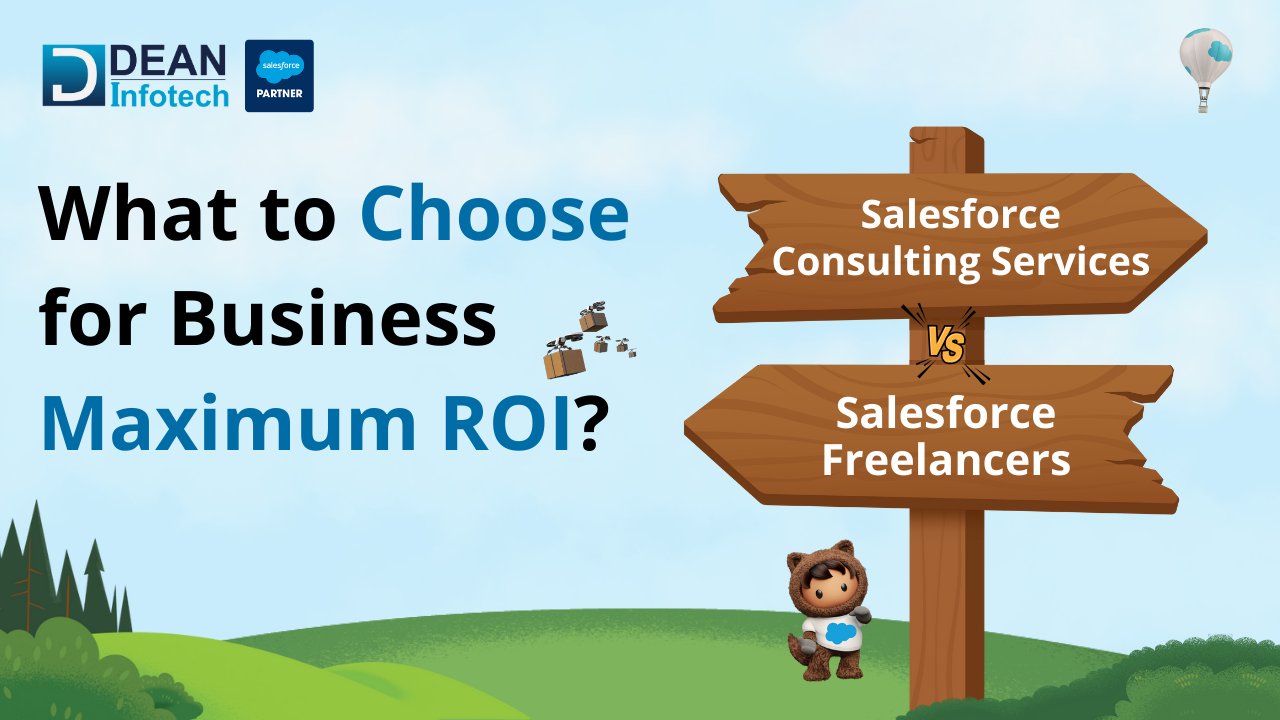
Let's face it—running a business today means juggling a ton of tools to keep customers happy, operations smooth, and revenue climbing. Salesforce has become a go-to for all that, helping everything from scrappy startups building their first CRM setup to big corporations tweaking intricate systems. But here's the thing: Salesforce is only as good as the experts you bring in to make it work for you. Deciding between a full-fledged Salesforce consulting service or a solo freelancer isn't just about pinching pennies—it's a big call that can make or break your project's success and how much bang you get for your buck in the long run. Pick wisely, and you'll see your Salesforce setup syncing perfectly with what your business actually needs, boosting efficiency and delivering real, trackable wins.
Salesforce and its partners are expected to generate $1.6 trillion in new business revenues for customers by 2026, with consulting firms playing a key role in unlocking this through end-to-end implementations that boost efficiency and ROI, far beyond one-off freelance tasks.
The Salesforce world is exploding right now, with companies in every sector—from sales and marketing to customer support and data crunching—diving in headfirst. Just look at the numbers: according to the latest IDC report on Salesforce's economic impact, the ecosystem is set to create 11.6 million net new jobs worldwide between 2022 and 2028, while generating a whopping $2.02 trillion in net new revenues for customers over that period. And in Salesforce's own FY25 Stakeholder Impact Report, they highlight how over 8,000 people kicked off careers in the ecosystem just last year, adding to more than 40,000 placements since 2021 through programs like Talent Alliance. With 7.4 million learners on Trailhead earning skills and certifications, it's clear the demand for pros who can tweak, integrate, and supercharge Salesforce is skyrocketing. So whether you're eyeing a massive rollout or a quick fix, nailing down the right help—be it a consulting firm or a freelancer—is key to riding this wave without getting left behind.
Understanding the both options
Okay, so you've got this big Salesforce project on your plate—maybe it's setting up a new CRM system or tweaking an existing one to handle more data. Before diving in, it's worth breaking down your main choices: going with a full consulting service or picking up a freelancer. Both can get the job done, but they come at it from totally different angles. Think of consulting services as your all-in-one shop with a team behind them, while freelancers are more like that reliable handyman who shows up for specific fixes. Let's unpack what each really brings to the mix, backed by some real-world insights.
1. What Salesforce Consulting Services Offer
Hiring a consulting firm is like bringing in a squad of pros who live and breathe Salesforce. These companies don't just slap together a quick setup; they handle everything from the ground up. For starters, they provide expert support tailored to your business, whipping up customized solutions that fit like a glove—whether that's integrating with other tools or automating workflows to speed things up. And get this: firms like these can slash your app development time by about 50% and deployment by 59%, leading to an average ROI of 478% over time, according to industry stats. They also throw in ongoing support, like training your team and keeping things compliant with the latest regs, which saves you headaches down the road. Plus, with access to certified experts in areas like implementation, customization, and even strategic planning, you're not just fixing today's problems—you're setting up for future growth. It's all about that deep bench of knowledge and resources, making them ideal if your project's got layers or you're aiming for long-haul efficiency.
2. What Freelancers Bring to the Table
On the flip side, freelancers are the agile option—independent folks who jump in for targeted gigs without the overhead of a big firm. The big win here? Cost savings and flexibility. You pay only for the hours or tasks you need, which can be a game-changer for smaller budgets or quick jobs like customizing a dashboard or fixing a bug. They're super scalable too—you can hire one for a two-week automation tweak, hit pause, and bring them back months later without strings attached. Many freelancers have niche skills, like deep dives into specific Salesforce features, and you get that direct, one-on-one vibe, which makes communication straightforward and keeps things moving fast for straightforward projects. Sure, they might not have a whole team backing them up, but for cost-effectiveness and ease on smaller scales, they're hard to beat—especially if you're a startup or just need a one-off boost.
Why This Difference Matters to Salesforce Customers
Alright, so we've laid out what consulting services and freelancers each throw into the pot—but why should you, as a Salesforce user, actually sweat over these differences? It's not just about picking a team or a lone wolf; it's about how this choice ripples through your day-to-day operations, your bottom line, and even your company's future trajectory. Let's break it down with some real talk and hard numbers, because at the end of the day, you're chasing that sweet ROI without the headaches.
First off, think about the scale of your Salesforce needs. If you're a mid-sized company juggling complex integrations across sales, marketing, and customer service, a consulting firm's team-based approach can be a lifesaver. They've got the bandwidth to handle it all without dropping balls, which means fewer delays and a smoother rollout. On the flip side, if you're just needing a quick Apex code tweak or a dashboard refresh, a freelancer's agility lets you zip through without overcommitting resources. But get this wrong—say, by handing a big, strategic overhaul to a solo freelancer—and you could end up with mismatched solutions that cost more to fix later. According to industry insights, businesses using structured Salesforce consulting see an 18.4% bump in ROI, thanks to optimized setups that crank up efficiency and decision-making speed by a whopping 38%. That's real money talking, especially when you're trying to squeeze every drop out of your CRM investment.
Then there's the risk factor. Freelancers bring that personal touch and lower upfront costs, which is awesome for budget-conscious startups or one-off fixes. But without the backing of a firm, things like accountability and long-term support can feel shaky—if your freelancer ghosts mid-project or lacks the depth for evolving needs, you're back to square one. Consulting services, with their proven frameworks and SLAs (service level agreements), flip that script by minimizing disruptions and ensuring continuity. This matters big time for customers because it protects your ROI; one study highlights how consulting partners deliver long-term value through scalability and best practices, turning what could be a costly gamble into a strategic win. For instance, imagine scaling your Salesforce setup as your business grows—firms can ramp up with specialized experts, while a freelancer might max out, leading to hidden costs down the road.
- Salesforce is a long-term investment, not a one-time setup.
Businesses rely on it to drive sales, improve customer engagement, and scale operations across multiple teams and geographies. - Around 70% of CRM projects fail to meet their goals due to poor planning, lack of expertise, or misaligned implementation strategies.
- Consulting firms bring a structured, team-based approach with certified experts, ensuring compliance, scalability, and better adoption.
- Freelancers often focus on task completion, not strategic alignment, which may result in a lack of cohesive planning for future business needs.
- Scalability becomes a challenge with freelancers, especially when expanding into multiple Salesforce clouds (Sales, Service, Marketing) or integrating with ERP systems.
- The wrong choice can lead to data silos, process inconsistencies, and costly rework, delaying ROI realization.
- A strategic start pays off in the long term, as the right partner ensures your CRM evolves with your business rather than becoming a bottleneck.
Read More : Top 15 Salesforce Consulting Firms in 2025
Factors that Influence the Decision
Choosing between Salesforce consulting services and freelancers isn’t a one-size-fits-all decision. Each option comes with distinct advantages and trade-offs that can shape your ROI for years to come. Below are the key factors you should weigh carefully.
1. Cost vs. Value: The Real ROI Factor
- Consulting Services: Typically range between $120–$250/hour in the US & UK, $80–$150/hour in Europe, and $35–$80/hour in India or Southeast Asia. Their costs include not just development, but also project planning, testing, change management, and ongoing support.
- Freelancers: Average around $40–$100/hour (depending on location and expertise). Initial costs are lower, but lack of structured planning or inadequate documentation can lead to hidden costs like rework, project delays, or post-go-live bugs.
- Fact: According to a Salesforce survey, over 60% of failed CRM projects are linked to poor implementation planning or lack of post-launch support — issues more commonly associated with low-cost or single-resource setups.
2. Expertise and Resources
- Consulting firms provide multidisciplinary expertise — solution architects, admins, developers, business analysts, and QA teams — ensuring every part of your Salesforce ecosystem is addressed.
- Freelancers often have niche expertise (e.g., just Apex development or Flow automation) but may not be able to provide an end-to-end solution, especially if your project involves integrations (ERP, HubSpot, Marketing Cloud) or compliance needs (GDPR, HIPAA).
3. Scalability and Future Growth
- Consultants are structured to scale with you — whether that means expanding to Service Cloud, enabling AI features like Einstein, or rolling out to multiple regions.
- Freelancers may become a bottleneck as your needs grow, especially if they can’t commit full-time or lack a backup team.
4. Engagement Model
- Consulting services follow structured engagement models — fixed price, milestone-based, agile retainers, or managed services — providing better predictability.
- Freelancers often work on hourly or project-based contracts, offering flexibility but with fewer guardrails for delivery timelines and scope creep.
5. Risk Management and Accountability
- Consulting partners usually offer Service Level Agreements (SLAs), maintain compliance with ISO, SOC, or GDPR, and have legal accountability clauses.
- Freelancers may operate informally or as independent contractors, meaning if something goes wrong (e.g., data breach, project failure), liability is often limited or non-existent.
6. Innovation and Strategic Impact
- Consultants are more likely to bring proactive innovation, suggesting best practices, process optimization, and upcoming Salesforce roadmap features (e.g., AI Cloud, Genie Data Cloud).
- Freelancers typically work within the defined scope and are less incentivized to propose future-proof strategies.
Picking between a Salesforce consulting service and a freelancer isn't a one-size-fits-all deal—it's all about weighing what your business really needs against what each option delivers. Maybe you're a startup scraping by on a tight budget, or a growing enterprise that can't afford downtime. Either way, several key factors come into play that can tip the scales and directly affect your ROI.
Average Salesforce Consulting Rate Hourly By Region
Let's cut to the chase—when you're budgeting for Salesforce help, rates aren't one-size-fits-all. They swing based on whether you're going with a full-blown consulting firm (think teams of certified pros with all the bells and whistles) or a freelancer (solo experts who keep things lean and mean). Drawing from the latest 2025 market data, consulting firms charge a premium for their structure, scalability, and ongoing support, while freelancers offer flexibility at a lower entry point but might not scale as seamlessly for big projects.
United States: $100 – $200+
High demand for certified consultants and complex enterprise requirements keep rates on the premium sides.United Kingdom: ~$60 – $250
A wide range influenced by both independent consultants and large consulting firms serving diverse industries.Canada: ~$50 – $200
Moderate to high rates depending on specialization, with strong expertise in financial and retail sectors.Australia: $100 – $200
Rates are on par with the US, driven by enterprise-grade implementations and compliance needs.India: $25 – $200
Known for its competitive pricing and vast talent pool, India is a leading outsourcing hub for Salesforce services.UAE: ~$110 – $165
Rates are mid-to-high, reflecting the region’s growing focus on digital transformation and CRM modernization.Western Europe (Germany, France, Netherlands): ~$120 – $250
Rates are higher due to GDPR compliance, language expertise, and a strong enterprise Salesforce market.
Why the gap between firms and freelancers?
Firms bake in project management, SLAs, and scalability (e.g., swapping resources if someone bails), which justifies the markup—especially for complex setups like multi-cloud integrations. Freelancers? They're nimble for quick wins, like dashboard tweaks, but might charge extras for revisions or lack backups. If you're a startup testing the waters, start with a freelancer to keep costs low; for enterprise growth, a firm's structure pays off in ROI through fewer headaches.
Tips to Save on Salesforce Consulting Rates
Hiring Salesforce consultants doesn’t always have to break the bank. By making strategic decisions, businesses can significantly reduce costs while maintaining quality.
1. Define Clear Requirements Before Hiring
- Avoid scope creep by documenting exact needs (customization, integration, automation, etc.).
- This helps consultants give accurate quotes instead of overestimating.
2. Choose the Right Engagement Model
- Opt for fixed-price projects when requirements are well-defined.
- Go for hourly rates only if the project scope is flexible or evolving.
3. Outsource to Cost-Effective Regions
- Countries like India and Canada offer skilled consultants at competitive rates without compromising on expertise.
4. Leverage Salesforce Partners & Networks
- Certified Salesforce Partners may have pre-built templates, accelerators, or partner discounts that save time and money.
5. Use a Blended Team Approach
- Combine senior consultants for strategy with junior resources for execution to optimize costs.
6. Start with a Pilot Project
- Begin with a small phase to validate expertise before committing to a larger engagement.
7. Negotiate Long-Term Contracts
- Many consultants and firms offer discounted rates for long-term or retainer-based contracts.
Conclusion : Choose India's Best Salesforce Consulting Partner – Dean Infotech
When it comes to Salesforce implementation, customization, or ongoing support, the right consulting partner can make all the difference between a successful transformation and a costly misstep. While freelancers may offer flexibility, they often lack the scalability, accountability, and deep expertise required for complex, growth-driven projects.
By partnering India's Best Salesforce Consulting Partner Dean Infotech – a Salesforce Gold Consulting Partner, you gain access to:
- Certified Salesforce Experts with experience across multiple industries.
- Cost-effective solutions tailored to your business goals.
- Proven methodologies that ensure faster implementation and maximum ROI.
- Global presence with delivery excellence from India to the USA, UK, and Australia.
We specialize in:
✅ Salesforce Implementation Partners – Sales Cloud, Service Cloud, Marketing Cloud
✅ Salesforce Development Company Services – custom apps, Lightning, Apex, LWC
✅ Salesforce Integration – APIs, middleware, and enterprise-grade integrations
✅ Salesforce CPQ Experts – configure-price-quote solutions for faster deal closures
✅ Salesforce Support & Maintenance Partner – 24/7 monitoring, optimization, and updates
Whether you're a startup aiming to scale, a mid-sized company optimizing workflows, or a large enterprise transforming digitally, Dean Infotech delivers Salesforce solutions that are innovative, reliable, and future-ready—all at competitive rates.
Ready to achieve maximum ROI with Salesforce?
Contact Dean Infotech today and start your journey toward smarter, scalable CRM success.

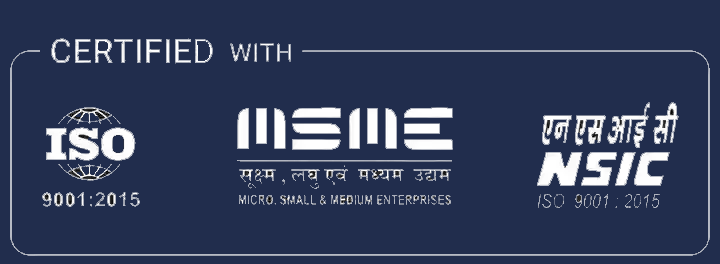
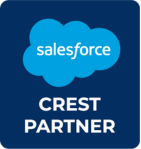
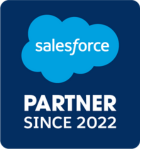
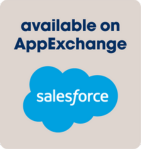
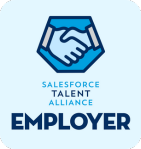


Comment